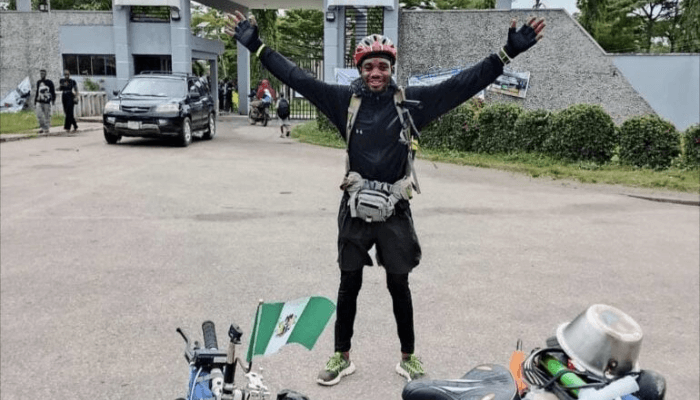Human security and national stability: Emmanuel Aondoungwa’s campaign for the displaced and the broader security imperative
As the days go by, we must not forget the great Nigerian cyclist, Emmanuel Aondoungwa, popularly known as Emmiwuks. His journey may seem unconventional to some, yet deeply meaningful to others. The purpose behind his mission is clear: to campaign and raise awareness about the plight of internally displaced persons (IDPs) and the growing insecurity across Nigeria and the African continent.
Emmiwuks has already toured several African nations on his bicycle, often sleeping on open roads, balconies, and in abandoned buildings throughout his voyage. His courage to embark on such a mission is priceless. His effort is not about personal recognition; it is about humanity, resilience, and shared responsibility. No one is complete without another, we are all bound together in a single garment of destiny.
According to the Internal Displacement Monitoring Centre (IDMC), by the end of 2023, Nigeria hosted approximately 3.4 million internally displaced persons, with about 291,000 new displacements recorded that year. The United Nations High Commissioner for Refugees (UNHCR) attributes these numbers to escalating conflicts, banditry, and climate-induced crises. In Benue State, reports from the Benue State Emergency Management Agency (SEMA) indicate that over 510,000 individuals have been displaced since December 2024, with a majority uprooted by recurrent farmer–herder clashes. Plateau State has faced a similar humanitarian strain, where attacks on rural communities have forced thousands into temporary shelters.
The European Union, recognizing the magnitude of this crisis, committed an additional €250,000 in humanitarian aid in 2025 to support at least 15,000 displaced persons in Benue and Plateau. The International Organization for Migration (IOM) has also noted that the prolonged nature of displacement in Nigeria threatens not just humanitarian stability but broader national and regional security, as displacement often fuels migration pressures, criminal recruitment, and intercommunal violence.
The significance of campaigns like Emmanuel Aondoungwa’s extends beyond compassion; it represents an early-warning instrument within the wider architecture of national security. When awareness grows, complacency shrinks. When attention shifts toward the human cost of insecurity, leaders and institutions are compelled to act. Public awareness strengthens accountability, mobilizes resources, and inspires policy interventions that can prevent further deterioration of safety on land and at sea.
The connection between internal displacement and maritime security may seem distant, yet they are interlinked. Displacement disrupts inland economies, agricultural production, and trade routes, factors that indirectly affect ports, riverine logistics, and coastal stability. When internal conflicts push populations toward the coastlines or drive unemployed youth toward illicit maritime activities, the effects are felt in piracy, smuggling, and human trafficking across the Gulf of Guinea. Thus, addressing internal insecurity contributes to maritime order. Insecurity on land eventually translates into instability at sea.
Emmiwuks’ journey therefore symbolizes a grassroots form of strategic security advocacy. Through his endurance and visibility, he bridges humanitarian empathy with national consciousness. He forces attention toward the invisible crises that weaken social cohesion and undermine long-term peace. His message is not only moral but structural: by restoring dignity to displaced persons, we reinforce the foundation of collective security.
Insecurity is not limited to armed conflict or territorial defense; it begins where people lose hope, livelihoods, and belonging. Campaigns that rekindle awareness of these realities promote cooperation among citizens, government, and international partners. That cooperation, fostered through empathy, builds resilience and deters instability.
By raising awareness about internally displaced persons, Emmanuel Aondoungwa reminds us that security begins with inclusion. His journey across nations, through hardship and uncertainty, is a testament to the power of individual initiative in reshaping public consciousness. It shows that the protection of people on land safeguards the integrity of nations, economies, and even seas.
Let us, therefore, support this remarkable Nigerian, Emmanuel Aondoungwa (Emmiwuks), whose campaign demonstrates that when we stand for humanity, we stand for security. His wheels in motion are more than a ride; they are a moving declaration that peace, stability, and awareness must travel together, on the road, in our communities, and across the waters that connect us all.

